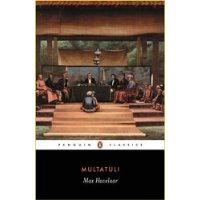| 商家名称 |
信用等级 |
购买信息 |
订购本书 |
|
|
 |
Max Havelaar: Or the Coffee Auctions of the Dutch Trading Company |
 |
|
 |
Max Havelaar: Or the Coffee Auctions of the Dutch Trading Company |
 |

基本信息·出版社:Penguin Classics
·页码:352 页
·出版日期:1995年09月
·ISBN:0140445161
·条形码:9780140445169
·装帧:平装
·正文语种:英语
·丛书名:Penguin Classics
·外文书名:咖啡拍卖会
内容简介 在线阅读本书
Max Havelaar - a Dutch civil servant in Java - burns with an insatiable desire to end the ill treatment and oppression inflicted on the native peoples by the colonial administration. Max is an inspirational figure, but he is also a flawed idealist whose vow to protect the Javanese from cruelty ends in his own downfall. In Max Havelaar, Multatuli (the pseudonym for Eduard Douwes Dekker) vividly recreated his own experiences in Java and tellingly depicts the hypocrisy of those who gained from the corrupt coffee trade. Sending shockwaves through the Dutch nation when it was published in 1860, this damning expose of the terrible conditions in the colonies led to welfare reforms in Java and continues to inspire the fairtrade movement today. Roy Edwards's vibrant translation conveys the satirical and innovative style of Multatuli's autobiographical polemic. In his introduction, R. P. Meijer discusses the author's tempestuous life and career, the controversy the novel aroused and its unusual narrative structure.
作者简介 Multatuli is the pseudonym of Eduard Douwes Dekker (1820-1887). After 18 years of civil service in the Dutch East Indies, he returned to Europe in 1856 a disillusioned man. The way the natives were treated by their own as well as by the Dutch rulers offended him so much that he resigned after a public conflict. In his novel Max Havelaar he recorded his experiences. The book was published in 1860 and made him an instant success. Encouraged by this public acclaim, he decided to pursue a career as a writer. He became a sort of national conscience, inspiring emancipatory movements such as freethinkers, socialists and anarchists. Multatuli's career as a writer lasted exactly as long as his career as an official: 18 years. Then, once more profoundly disillusioned, he decided to give up writing and took refuge in Germany, where he died in February 1887.
编辑推荐 Amazon.com When
Max Havelaar was first published in Holland in 1860, it ignited a major political and social brouhaha. The novel, written by a former official of the Dutch East Indian Civil Service under the pen name Multatuli, exposed the massive corruption and cruelty rife in the Dutch colony of Java.
Max Havelaar is an undeniably autobiographical novel; like his hero, Multatuli--the pseudonym for Eduard Douwes Dekker--was an Assistant Resident of Lebak in Java; like Havelaar in the novel, he resigned his position when his accusations of corruption and abuse were disregarded by higher authorities, resulting in years of poverty for both author and fictional hero.
Max Havelaar is told from several different perspectives; the reader first meets an Amsterdam coffee dealer named Droogstoppel, a man so obsessed with coffee that his every thought and action is governed by it. Droogstoppel has come by a manuscript from an old schoolmate who, down on his luck, has asked him to get it published. The schoolmate is Havelaar, and the manuscript relates his experiences as an idealistic and generous young civil servant who tries to protect the poor and bring justice to the powerless.
The central part of the novel details conditions in Java, particularly Havelaar's efforts to correct injustices in the face of a corrupt government system. That his efforts will prove futile soon becomes apparent, and there is something almost Greek in the inevitability of Havelaar's declining fortunes. Despite its tragic themes, Max Havelaar is savagely funny, particularly the chapters narrated by Droogstoppel, a character unmatched for his veniality, narrow-mindedness, or singular lack of understanding or imagination. Though Multatuli's masterpiece is nearly 150 years old, it wears its age well, and Roy Edwards's excellent translation offers English-speaking readers a wonderful opportunity to experience one of the Netherlands's great literary classics.




